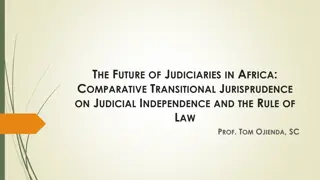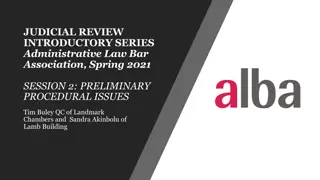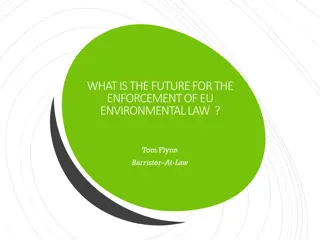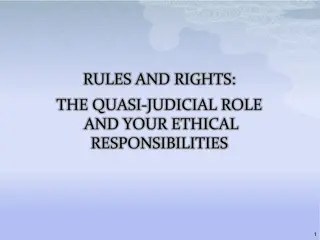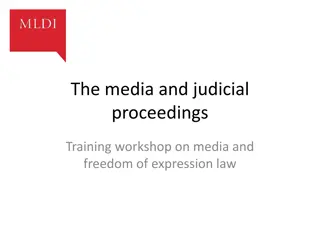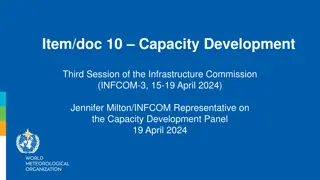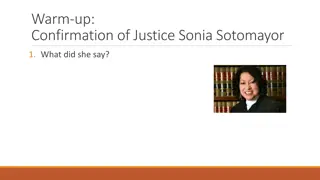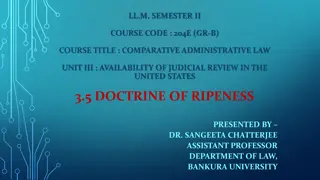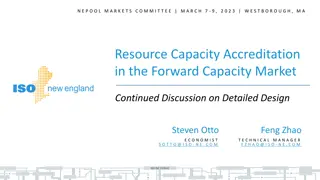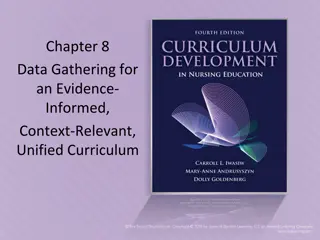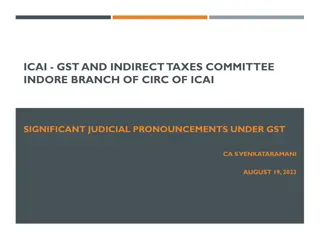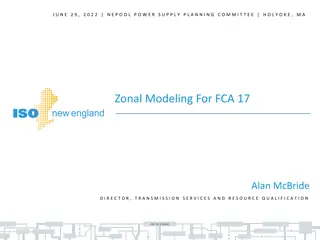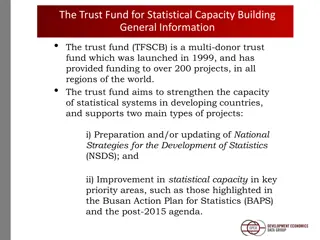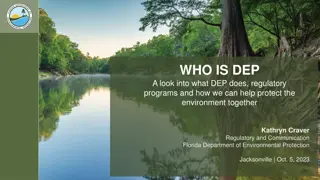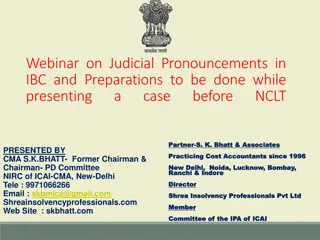Enhancing Judicial Capacity for Environmental Law: Curriculum and Challenges
Environmental law curriculum for judicial education emphasizes the importance of knowledge and expertise in handling environmental justice issues. Prerequisites include competent rule of law, mature judicial system, independent bar, and well-equipped enforcement agencies. To address challenges faced by the judiciary in environmental cases, there is a need to strengthen adjudication processes and build judicial capacity. Areas for judicial training encompass knowledge of applied norms, case studies, techniques, and adopting remedies for environmental wrongs.
Download Presentation

Please find below an Image/Link to download the presentation.
The content on the website is provided AS IS for your information and personal use only. It may not be sold, licensed, or shared on other websites without obtaining consent from the author. Download presentation by click this link. If you encounter any issues during the download, it is possible that the publisher has removed the file from their server.
E N D
Presentation Transcript
Environmental law Curricula For Judicial Education Binod Prasad Sharma Faculty/ Judge High Court National Judicial Academy, Nepal
Background Environmental issues and legal and policy responses to them demand special knowledge and expertise. Prerequisites required to handle environmental justice issues.
Prerequisites: Elements Competencies Rule of Law Well established and robust Judicial System Mature and Independent Bar Well - developed Environmental Prosecutors (Federal and Local) Enforcement Agencies (Federal and Local) Experienced Experienced Equipped with effective tool and resources Administrative agencies
Cont.. The environmental challenges. Judiciary plays enforcement a key role and in meeting compliance Reasons: give effect to constitutional protections introduce international environmental law in national jurisprudence provide concrete remedies to prevent environmental harm or compensate for it
Credibility Adjudication process must be strengthen Confidence Trust Foundation of Rule of Law Challenges faced by judiciary 1. Conceptual uncertainty from the volume and complexity of environmental cases 2. Hierarchical uncertainty in using various legislation from different levels international, national, and state; and 3. Historical and unethical uncertainty
To meet the challenges, there is a need to build judicial capacity and equip judges with adequate tools to interpret and implement the law. cadre or candidate judges Curriculum design for: continuing legal education environmental law specialist judges It will need to be conducted as part of an institutionalized ongoing scheme, including monitoring, evaluation, feedback, and retraining.
Areas for Judicial Training Judicial training need to be strengthened in the following areas: 1. Knowledge of the norms applied, 2. Knowledge on norms applied in the national and international context, 3. Knowledge on case studies in the region, 4. Techniques used by colleagues in the region in addressing environmental issues, and 5. Adopting requisite remedies to address environmental wrongs.
Generic themes of Judicial education course modules : 1. Comparative procedure for public interest litigation (e.g. Amparo, citizen suit, locus standi, access to justice provisions, permit or EIA judicial review, Aarhus Convention etc.) 2. The distinct characteristics of and complementary roles served by administrative, civil and criminal proceedings, Private environmental claims (e.g., civil procedure, notice, delicts, torts, contractual claims, remedies, etc.) 3. Remedies appropriate for different types of environmental civil cases (e.g., civil procedure, damages, remedial measures, restoration, structural injunctions, preliminary relief, nullification, measures, continuing jurisdiction, etc.) monitoring of remedial
Cont.. 4. Criminal law (e.g., sanctions, criminal procedure, scientific evidence for proving environmental crimes, (probation, fines, prison terms) 5. Basics of Environmental Science for Judges (e.g. including understanding risk assessment, dealing with uncertainty, how to measure environmental injury or the efficacy of remediation, etc.) 6. Evidence (e.g., types of scientific proof, burdens of proof, use of investigators, etc.) 7. Essential elements of Administrative Law and judicial review thereof Appeals from courts of first instance (e.g., records, standards of review, remands, etc.
Cont.. Judicial enforcement of arbitral award 8. (e.g., public policy constraints, environmental factors, etc.) Judicial Decisions 9. (e.g., access or decisions and records, reporting decisions officially and unofficially, notice, electronic filings, etc.) 10. Use of Alternative Dispute Resolution techniques in environmental conflicts, Special Environmental Measures for special courts (e.g., Fiscal Tribunals, administrative law tribunals, e.g. for water resources, regional air pollution tribunals, wetlands, etc.)
Cont.. 11.Basics of Environmental Economics for Judges (e.g., including how to measure and value externalities and ecosystem services, working with technical experts, and evaluating technical evidence. The process of determining the correct balance point between economic benefits of enterprise and the environmental harm associated with it. 12.Environmental law and labor law disputes (e.g., role of ILO Conventions, health and safety claims, etc.) 13.Judicial oversight of Biodiversity habitats, migration corridors and legally protected areas (e.g., warden and ranger led-enforcement actions, remediation orders, monitoring of special habitat protection zones, trans-boundary peace park dispute settlement, etc.)
Cont.. 14. Indigenous Peoples and application of environmental law and international norms (e.g. UN Declaration on the Rights of Indigenous Peoples in environmental contexts, WTO and Convention on Bio-Diversity regimes, law enforcement in tribal courts, etc. and discussion could be made on the case Provincial Heritage Resource Authority for Eastern Cape v Gordon 2005 (2) SA 283 (E) 15. Overview obligations of MEAs and International Environmental Law (e.g. fact-finding and dispute settlement and compliance matters, proving environmental treaty obligations in national courts, etc.) 16. Surveys of National Environmental Law, and updates (especially within a given nation for the judges of its own courts) 17. Analysis of adaptation legal issues in property law regimes
Cont.. 18. The Public Trust Doctrine and other legal frameworks in the wake of sea level rise, and other physical changes resulting from climate change (comparative law on adaptation measures and remedies arising in judicial contexts in order to cope with phenomena of climate change 19. Rule of Law safeguards (judicial ethics, qualifications of judges and court officers, transparency, notice, fees etc.) 20. Scope of continuing judicial education in environmental adjudication and how to institutionalize it in national programs
Some Landmark Decision of Different Courts fruitful for Discussion Supreme Court of the United States United States Federal Courts United States District Court, New York Court of Appeal, New Zealand Constitutional Court of South Africa Federal Court of Australia
Material for Module Preparation Contribution from the worldwide environmental court Comparative experience It includes : judicial practices, case studies and primary source materials
Objective of Preparing Module To educate the current generation of Judges for environmental adjudication To build the network collaboration among national judicial institutes
Finally Work continuing judicial education modules necessarily must proceed incrementally. to prepare such an extensive set of All modules cannot be prepared at once. Priority themes, such as enhancing civil remedies or refining criminal environmental law sanction, would be selected to begin preparing modules








